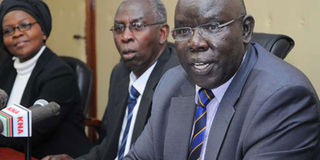Universities cautioned over setting up campuses outside Kenya

Commission for University Education CEO David Some (right) speaks to reporters at Jogoo House on January 22, 2016. Prof Some has said there is no policy to guide public universities in establishing branches outside the country. PHOTO | JAMES EKWAM | NATION MEDIA GROUP
What you need to know:
- JUKAT has campuses in Tanzania and Rwanda.
- This year, the government allocated Sh52.9 billion, up from Sh34 billion last year to 31 public universities.
The Commission for University Education (CUE) has cautioned public universities over setting up campuses in foreign countries, saying they will have to justify their reasons.
CUE Chief Executive Officer David Some said the campuses do not enrol government-sponsored students though they are funded by the exchequer.
Prof Some observed that though the agency does not have the mandate to accredit courses offered outside Kenya, they will still crack the whip.
"The commission does not recognise the campuses outside the country, which according to the regulator, have failed to observe the criteria on establishing campuses.
"I told them to declare campuses that have not been accredited. Rather than opening a campus in, for instance, Kakamega, they do so in another country because they don’t want to be inspected,” he said.
This year, the government allocated Sh52.9 billion to 31 public universities, up from Sh34 billion last year.
Jomo Kenyatta University of Agriculture and Technology (JKUAT) has campuses in Tanzania and Rwanda offering undergraduate and post-graduate courses.
The University of Nairobi and the University of Rwanda recently held discussions on a partnership.
Among private universities, Mount Kenya is in Rwanda.
The Saturday Nation has learnt that MKU’s Kigali campus, which appointed Prof Edwin Odhuno as the vice-chancellor designate, has already applied to the Rwanda Higher Education Council to become an independent university.
Prof Some said that there is no policy to guide public universities in establishing branches outside the country.
Additionally, Kenya Universities and Colleges Central Placement Service Chief Executive John Muraguri said the board can only admit students to public universities in Kenya.
During a recent event at Egerton University, Education Cabinet Secretary Fred Matiang’i said funding to each institution was to be streamlined by the recently appointed members of the Universities Funding Board, which will be responsible for decisions on prudent cash disbursements.
“We have no excuse other than running fast to catch up with other countries on university education,” said Dr Matiang'i.
Regulations state that a campus should be the lowest unit of any local university, and is required to have local administrative structures clearly linked to the main institution.
The 2015 Economic Survey showed that university enrolment rose by 22.8 per cent; from 361,379 in 2013 to 443,783 in 2014, and in 2015, an additional 100,000 students were admitted to public and private universities.





